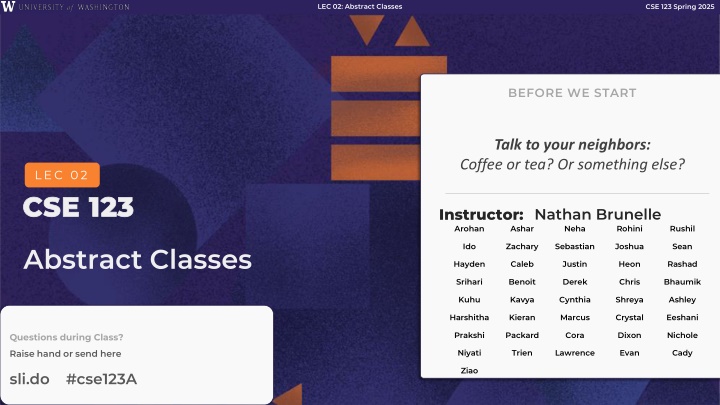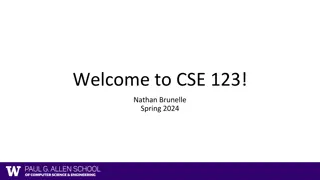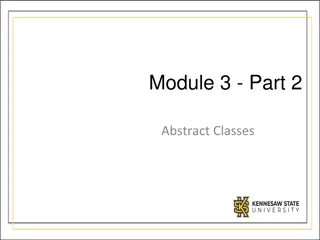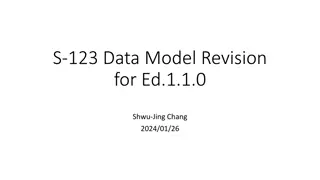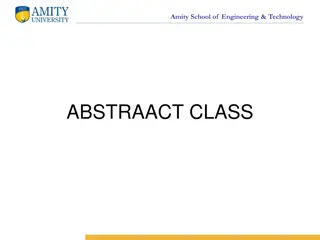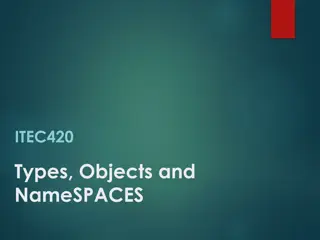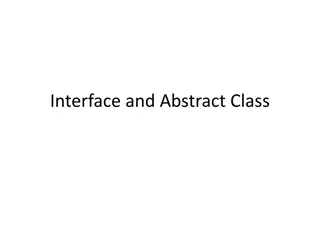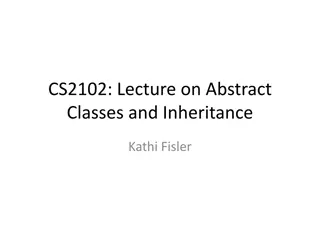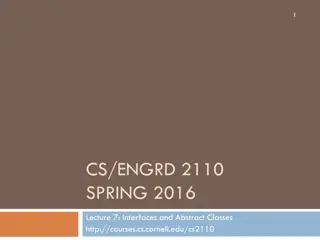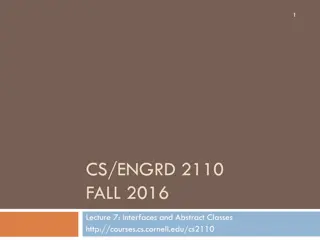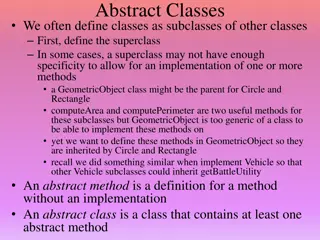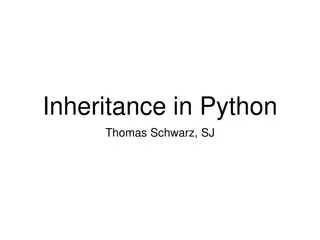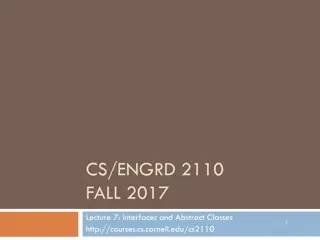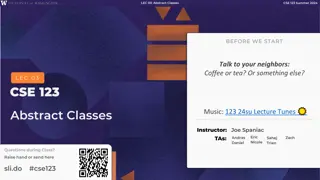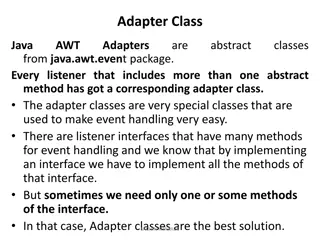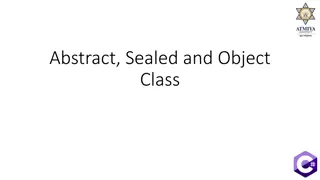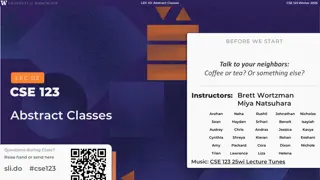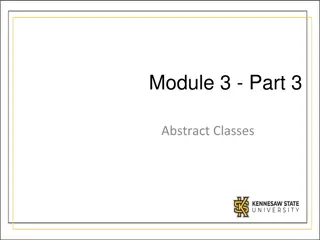Abstract Classes Review in CSE 123: Spring 2025
The concepts of abstract classes, polymorphism, declared vs. actual type, and compiler vs. runtime errors in the context of CSE 123 for the Spring 2025 semester. Dive into is-a relationships, inheritance, and more in this informative session.
Download Presentation

Please find below an Image/Link to download the presentation.
The content on the website is provided AS IS for your information and personal use only. It may not be sold, licensed, or shared on other websites without obtaining consent from the author.If you encounter any issues during the download, it is possible that the publisher has removed the file from their server.
You are allowed to download the files provided on this website for personal or commercial use, subject to the condition that they are used lawfully. All files are the property of their respective owners.
The content on the website is provided AS IS for your information and personal use only. It may not be sold, licensed, or shared on other websites without obtaining consent from the author.
E N D
Presentation Transcript
LEC 02: Abstract Classes CSE 123 Spring 2025 BEFORE WE START Talk to your neighbors: Coffee or tea? Or something else? LEC 02 CSE 123 CSE 123 Instructor: Nathan Brunelle Arohan Ashar Neha Rohini Rushil Ido Zachary Sebastian Joshua Sean Abstract Classes Hayden Caleb Justin Heon Rashad Srihari Benoit Derek Chris Bhaumik Kuhu Kavya Cynthia Shreya Ashley Harshitha Kieran Marcus Crystal Eeshani Prakshi Packard Cora Dixon Nichole Questions during Class? Niyati Trien Lawrence Evan Cady Raise hand or send here Ziao sli.do #cse123A
LEC 02: Abstract Classes CSE 123 Spring 2025 Announcements Creative Project 0 due tonight, Wed April 9 at 11:59pm! - See generic Creative Project rubric posted on website Programming Assignment 0 will be released tomorrow, Thurs April 9 - Focused on inheritance and abstract classes
LEC 02: Abstract Classes CSE 123 Spring 2025 Lecture Outline Polymorphism Review - Declared vs. Actual Type - Compiler vs. Runtime Errors Abstract Classes Review Pre/Post conditions and commenting
LEC 02: Abstract Classes CSE 123 Spring 2025 Review: Is-a Relationships Animal Birds Mammal Reptile Amphibian Fish Cat Dog
LEC 02: Abstract Classes CSE 123 Spring 2025 Polymorphism DeclaredType x = new ActualType() - All methods in DeclaredType can be called on x - We ve seen this with interfaces (List<String> vs. ArrayList<String>) - Can also be to inheritance relationships Animal[] arr = {new Dog(), new Cat(), new Bear()}; for (Animal a : arr) { a.feed(); }
LEC 02: Abstract Classes CSE 123 Spring 2025 Compiler vs. Runtime Errors DeclaredType x = new ActualType() - At compile time, Java only knows DeclaredType - Compiler error (CE): trying to call a method that isn t present Animal a = new Dog(); a.bark(); // No bark() -> CE - Can cast to change the DeclaredType of an object ((Dog) a).bark(); // No more CE - Runtime error (RE): attempting to cast to an invalid DeclaredType* Animal a = new Fish(); ((Dog) a).bark(); // Can t cast -> RE - Order matters! Compilation before runtime
LEC 02: Abstract Classes CSE 123 Spring 2025 Declared Type and Actual Type DeclaredType varName = new ActualType( ); Animal bucky = new Dog("Bucky"); Dog bucky = new Dog("Bucky"); Declared Type: Animal Actual Type: Dog Declared Type: Dog Actual Type: Dog Can call methods that makes sense for EVERY Animal If Dog overrides a method, uses the Dog version Can call methods that makes sense for EVERY Dog If Dog overrides a method, still uses the Dog version
LEC 02: Abstract Classes CSE 123 Spring 2025 Compiler vs. Runtime Errors
LEC 02: Abstract Classes CSE 123 Spring 2025 Inheritance and Method Calls Animal bucky = new Dog(); bucky.bark(); When compiling: Object Can we guarantee that the method exists for the declared type? extends Compiling: Look this way for bark is a Does the declared type or one of its super classes contain a method of that name? Animal Declared Type If not Compile Error! In this example: When compiling, neither Animal nor Object have a bark method, so we have a compile error! Dog Fish
LEC 02: Abstract Classes CSE 123 Spring 2025 Overrides and Method Calls Animal bucky = new Dog(); bucky.feed(); When running: Object Use the most specific version of the method call starting from the actual type. extends is a Start from the actual type, then go up to super classes until you find the method. Run that first-discovered version. Running: Look this way for feed Use the first implementation found Animal In this example: If the Dog class overrides feed, then we ll use the implementation in Dog. Otherwise we ll use the one in Animal Actual Type Dog Fish
LEC 02: Abstract Classes CSE 123 Spring 2025 Casting and Method Calls When compiling: Animal bucky = new Dog(); ((Dog) bucky).bark(); Can we guarantee that the method exists for the Cast-to type? Object Does the Cast-to type or one of its super classes contain a method of that name? Compiling: From cast-to type Look this way for bark If not Compile Error! When Running: Animal Running: From actual type Look this way for cast-to type Check that the Cast-to Type is either the Actual Type, or one of its super classes Cast-to Type Dog Fish This example has no error Actual Type
LEC 02: Abstract Classes CSE 123 Spring 2025 Casting and Method Calls When compiling: Animal bucky = new Fish(); ((Dog) bucky).bark(); Can we guarantee that the method exists for the Cast-to type? Object Does the Cast-to type or one of its super classes contain a method of that name? Compiling: From cast-to type Look this way for bark If not Compile Error! When Running: Animal Running: From actual type Look this way for cast-to type Check that the Cast-to Type is either the Actual Type, or one of its super classes Cast-to Type Dog Fish Actual Type This example has a runtime error
LEC 02: Abstract Classes CSE 123 Spring 2025 Practice What results from the following code being executed? (1) A.Compiler Error B.Runtime Error Animal bucky = new Dog(); bucky.bark(); C.Compiles and runs without error
LEC 02: Abstract Classes CSE 123 Spring 2025 Practice What results from the following code being executed? (2) A.Compiler Error B.Runtime Error Animal bucky = new Dog(); ((Dog) bucky).bark(); C.Compiles and runs without error
LEC 02: Abstract Classes CSE 123 Spring 2025 Practice What results from the following code being executed? (3) A.Compiler Error B.Runtime Error Animal bucky = new Dog(); ((String) bucky).meow(); C.Compiles and runs without error
LEC 02: Abstract Classes CSE 123 Spring 2025 Practice What results from the following code being executed? (4) A.Compiler Error B.Runtime Error Animal bucky = new Dog(); ((Reptile) bucky).slither(); C.Compiles and runs without error
LEC 02: Abstract Classes CSE 123 Spring 2025 Lecture Outline Polymorphism Review - Declared vs. Actual Type - Compiler vs. Runtime Errors Abstract Classes Review Pre/Post conditions and commenting
LEC 02: Abstract Classes CSE 123 Spring 2025 Abstract Classes Mixture of Interfaces and Classes - Interface similarities: - Can contain (abstract) method declarations - Can t be instantiated - Class similarities: - Can contain method implementations - Can have fields - Can have constructors Interfaces Classes Abstract Classes Is there identical / nearly similar behavior between classes that shouldn t inherit from one another?
LEC 02: Abstract Classes CSE 123 Spring 2025 Shape / Square / Circle Example The starter code contains Shape, Square, and Circle classes similar to the pre-class work, as well as a Client that prints out a couple of shapes. Add an abstract getName method to the Shape. - Add implementations of getName to Square and Circle that return "Square" and "Circle". Add a method isEmpty to Shape that tells you whether the shape is empty (has zero area) or not. - Hint: you will need to call getArea, but it may not immediately work Implementing isEmpty by calling getArea works fine as is, but suppose we wanted to implement it in Circle directly. How could we do this just by looking at the fields of the Circle? Implement it this way by overriding isEmpty in Circle. Override toString in Shape to return a similar message to what the Client prints in the starter code: - Hint: your toString can call abstract methods! Rewrite the Client class to use the new toString on shapes.
LEC 02: Abstract Classes CSE 123 Spring 2025 Advanced OOP Summary Abstract Allow us to define differing levels of abstraction - Interfaces = high-level specification - What behavior should this type of class have - Abstract classes = shared behavior + high-level specification - Classes = individual behavior implementation Inheritance allows us to share code via is-a relationships - Reduce redundancy / repeated code & enable polymorphism - Still might not be the best decision! - Interfaces extend other interfaces - (abstract) classes extend other (abstract) classes Interfaces Abstract Classes Classes Concrete You re now capable of designing some pretty complex systems!
LEC 02: Abstract Classes CSE 123 Spring 2025 Design in the real world In this course, we ll always give you expected behavior of the classes you write - Often not the case when programming for real - Clients don t really know what they want (but programmers don t either) My advice: - Clarify assumptions before making them (do I really want this functionality?) - There s no one right answer - Weigh the options, make a decision, and provide explanation - Iterative development: make mistakes and learn from them - Be receptive to feedback and be willing to change your mind
LEC 02: Abstract Classes CSE 123 Spring 2025 Interface versus Implementation Interface: what something should do Implementation: how something is done These are different! Big theme of CSE 123: choose between different implementations of same interface
